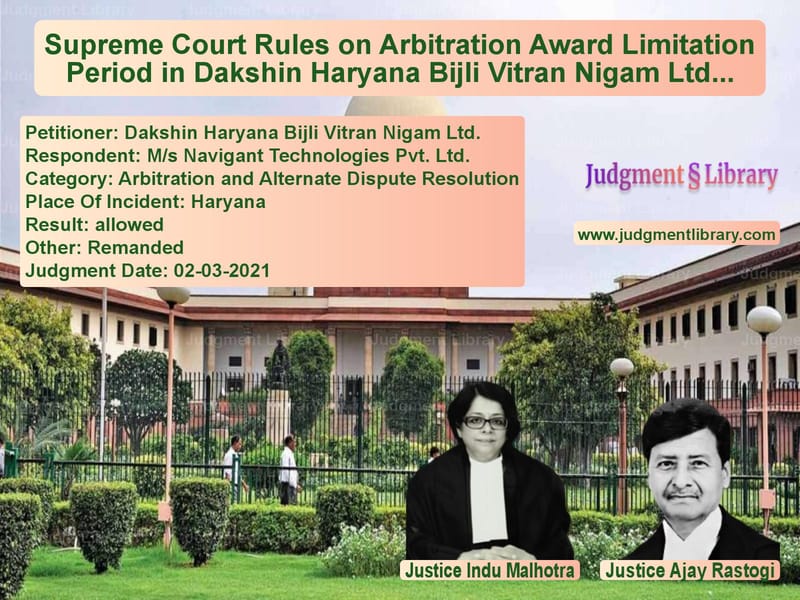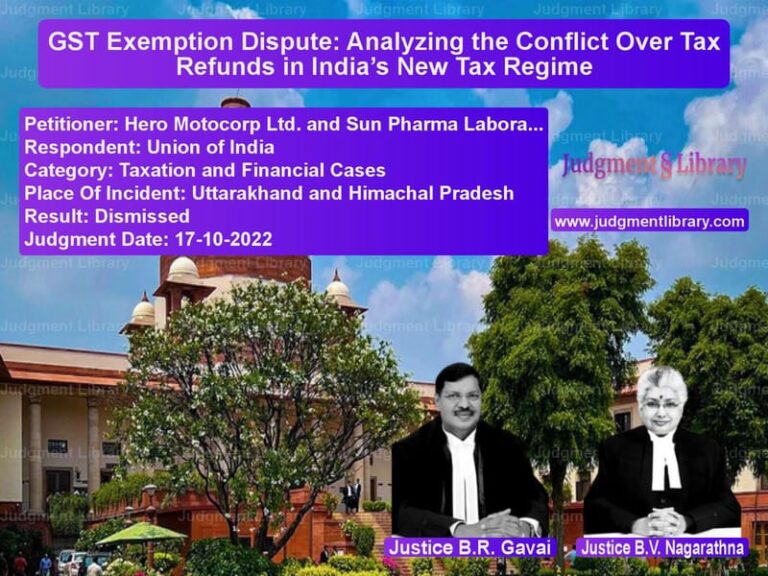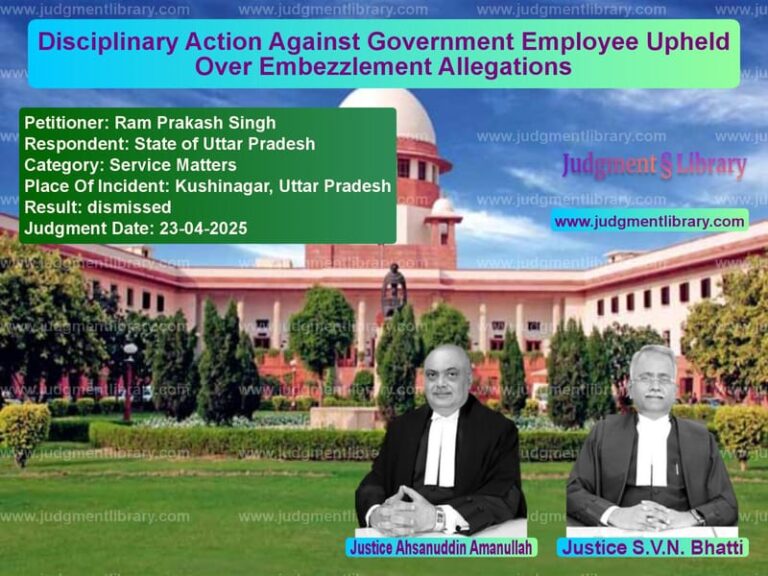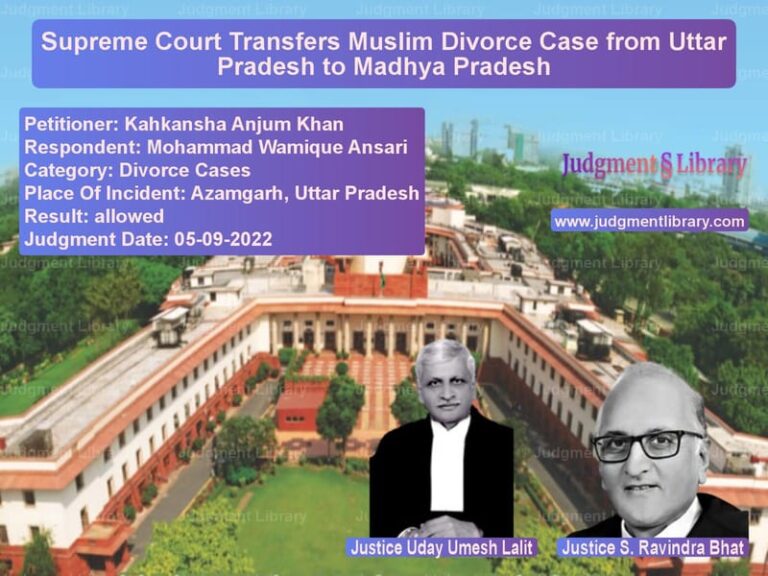Supreme Court Rules on Arbitration Award Limitation Period in Dakshin Haryana Bijli Vitran Nigam Ltd. Case
The Supreme Court of India recently delivered a significant judgment in the case of Dakshin Haryana Bijli Vitran Nigam Ltd. v. M/s Navigant Technologies Pvt. Ltd., focusing on the crucial issue of the limitation period for filing objections against an arbitral award under Section 34 of the Arbitration and Conciliation Act, 1996. The case involved the interpretation of when the limitation period begins in cases where a dissenting opinion is issued separately after the majority award.
Background of the Case
The dispute originated from a Service Level Agreement dated 02.05.2011, under which Dakshin Haryana Bijli Vitran Nigam Ltd. (the appellant) had engaged M/s Navigant Technologies Pvt. Ltd. (the respondent) for providing call center services. The agreement contained an arbitration clause (Clause 13), which provided that any disputes would be resolved by a three-member arbitral tribunal.
On 16.10.2014, the appellant corporation terminated the agreement, which led to disputes between the parties. The matter was referred to arbitration, and the arbitral tribunal delivered its award on 27.04.2018. The majority of the arbitrators ruled in favor of the respondent, awarding compensation for losses suffered due to the contract termination.
However, one of the three arbitrators dissented and issued a separate opinion on 12.05.2018. The tribunal then formally handed over the signed copies of the award and dissenting opinion to the parties on 19.05.2018, marking the termination of arbitral proceedings.
The appellant filed objections under Section 34 of the Arbitration and Conciliation Act on 10.09.2018. However, the Civil Court in Haryana dismissed the objections as time-barred, stating that the limitation period should have started from 27.04.2018, the date of the majority award. The appellant appealed to the High Court, which upheld the Civil Court’s decision, prompting the matter to be brought before the Supreme Court.
Arguments by the Petitioner (Dakshin Haryana Bijli Vitran Nigam Ltd.)
The petitioner argued:
- The limitation period should start from 19.05.2018, the date on which the signed copies of the award were provided to the parties.
- Under Section 31(5) of the Arbitration and Conciliation Act, 1996, an arbitral award is deemed to be made only when a signed copy is delivered to the parties.
- The dissenting opinion was part of the arbitral process and was not provided until 12.05.2018, meaning the limitation period should start from that date at the earliest.
- The tribunal explicitly scheduled a hearing on 19.05.2018 to hand over final copies, which should be considered the official delivery date.
Arguments by the Respondent (M/s Navigant Technologies Pvt. Ltd.)
The respondent countered:
- The limitation period started on 27.04.2018, when the majority award was pronounced.
- Under Section 34(3), an application for setting aside the award must be filed within three months from the date the party receives the award, plus an additional 30 days under exceptional circumstances.
- The minority dissenting opinion did not affect the enforceability of the majority award, and the tribunal’s ruling on 27.04.2018 was final.
- The objections were filed beyond the legally permissible time frame, making them ineligible for consideration.
Supreme Court’s Observations
The Supreme Court, led by Justices Indu Malhotra and Ajay Rastogi, examined the applicable legal provisions and prior judgments to determine the correct interpretation of the limitation period for filing objections.
1. Importance of Signed Award Delivery
“The receipt of a signed copy of the award is the date from which the period of limitation for filing objections under Section 34 would commence.”
The Court ruled that as per Section 31(5) of the Arbitration and Conciliation Act, an arbitral award is considered final only when a signed copy is delivered to the parties.
2. Relevance of the Dissenting Opinion
“In a multi-member tribunal, a dissenting opinion must be provided simultaneously with the majority award. However, in this case, the dissenting opinion was provided later, justifying the delay in calculating limitation.”
The Court acknowledged that the arbitrators had scheduled an additional hearing after issuing the dissenting opinion, which contributed to the determination of the award’s final delivery date.
3. Applicability of Precedents
“The judgment in Union of India v. Tecco Trichy Engineers (2005) held that the period of limitation for challenging an arbitral award begins only when a signed copy is delivered, reinforcing our view in this case.”
The Court cited established precedents, which supported the argument that the delivery of a signed copy, not just the pronouncement of the award, determines the limitation period.
Supreme Court’s Verdict
After reviewing the evidence and legal arguments, the Supreme Court ruled:
- The limitation period under Section 34(3) commenced on 19.05.2018, when the signed copy of the award was officially provided to the parties.
- The objections filed by the appellant on 10.09.2018 were within the statutory period and should be heard on merits.
- The judgments of the Civil Court and High Court were set aside.
- The case was remanded to the Civil Court for a fresh hearing on the merits of the objections.
Impact of the Judgment
This ruling has major implications for arbitration proceedings in India:
- It clarifies that the limitation period for objections begins only when the signed award is received, not when it is orally pronounced.
- It ensures fairness in arbitration by preventing parties from being disadvantaged due to procedural ambiguities.
- It reinforces the significance of providing written dissenting opinions simultaneously with majority awards.
Conclusion
The Supreme Court’s ruling in this case provides much-needed clarity on the application of limitation periods in arbitration cases. By emphasizing the importance of delivering a signed copy of the award to determine the limitation start date, the Court has upheld principles of fairness and procedural transparency in arbitration disputes.
Petitioner Name: Dakshin Haryana Bijli Vitran Nigam Ltd..Respondent Name: M/s Navigant Technologies Pvt. Ltd..Judgment By: Justice Indu Malhotra, Justice Ajay Rastogi.Place Of Incident: Haryana.Judgment Date: 02-03-2021.
Don’t miss out on the full details! Download the complete judgment in PDF format below and gain valuable insights instantly!
Download Judgment: dakshin-haryana-bijl-vs-ms-navigant-technol-supreme-court-of-india-judgment-dated-02-03-2021.pdf
Directly Download Judgment: Directly download this Judgment
See all petitions in Arbitration Act
See all petitions in Enforcement of Awards
See all petitions in Dispute Resolution Mechanisms
See all petitions in Judgment by Indu Malhotra
See all petitions in Judgment by Ajay Rastogi
See all petitions in allowed
See all petitions in Remanded
See all petitions in supreme court of India judgments March 2021
See all petitions in 2021 judgments
See all posts in Arbitration and Alternate Dispute Resolution Category
See all allowed petitions in Arbitration and Alternate Dispute Resolution Category
See all Dismissed petitions in Arbitration and Alternate Dispute Resolution Category
See all partially allowed petitions in Arbitration and Alternate Dispute Resolution Category







